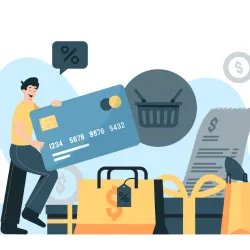An authorization hold is a valuable tool used to verify if a customer has enough funds to cover a transaction. Many everyday businesses use holds. For example, gas stations typically place authorization holds on your debit or credit card before you begin pumping your gas. This hold ensures you have enough money in your account to cover the charge for your gasoline.
Authorization holds are helpful in verifying funds before payments. Additionally, they may also help prevent chargebacks. As chargebacks continue to be a nuisance for many business owners throughout the United States, companies should explore all the prevention tools at their disposal, including authorization holds.
In this guide, we’ll explore everything you need to know about authorization holds as a transaction tool.
What Is an Authorization Hold?

An authorization hold is a payment processing tool that verifies the funds in a bank account or on a credit card. This mechanism places a “hold” on funds to ensure money is earmarked for a future payment. This process protects businesses from providing services or products for which a customer cannot pay.
An authorization hold is a standard part of the transaction process. Your payment processor automatically places a hold on a customers’ funds before it completes a transaction. Still, when people discuss authorization holds, they typically refer to holds that do not include an immediate transaction. An example of such is hotels holding funds for incidentals.
A temporary authorization and purchase authorization are other terms referring to the exact same mechanism as an authorization hold.
How Do Authorization Holds Work?
Authorization holds work by connecting with the customer’s bank or credit card provider to determine if there are enough funds to cover a charge. The funds are then placed on hold, which means the funds are no longer available to be used for other purchases. This means that if an individual has a credit card limit of $1,000 and you place a $500 hold on the card, the cardholder will have access to only the other $500 of their credit limit. The same is true for placing a hold on a debit card.
Once the business decides it no longer needs the authorization hold, it releases the funds. At this point, the funds are available for use again. For example, if an individual rents a car, the rental car service may place an authorization hold to protect itself from charges related to excessive mileage, damage, or other costs. If the renter returns the vehicle without it needing any additional charges, the business will release the funds. At this point, the cardholder regains access to their previously frozen money.
Why Should You Use Authorization Holds?
The purpose of authorization holds varies depending on the business. For example, gas stations, hotels, car rental providers, and a host of other companies utilize authorization holds to hold funds for future purchases. This protection mechanism ensures a customer can’t claim they don’t have enough money to cover the transaction. In this case, a hold acts as an insurance policy for the merchant.
Authorization holds are growing in popularity in other industries. This growth is due to two primary reasons:
- Fraud Protection: If a business is frequently the target of fraud, it may place an authorization hold on the card while performing other fraud checks. This is a valuable tool for businesses selling items often targeted by credit card thieves.
- Chargeback Prevention: If you want to reduce the chances of a chargeback damaging your merchant account, you can use an authorization hold to delay a transaction’s completion. If someone requests a refund, you can release the hold instead of suffering from a chargeback or processing a refund.
There are many reasons for merchants to place a hold before completing a transaction. If your industry is popular with credit card fraudsters, authorization holds can be particularly advantageous.
How Long Do Credit Card Authorizations Last?
Credit card authorizations last until the transaction is complete, funds are released, or a time limit is reached.

How long can a merchant hold funds?
The answer depends on the industry and terms set by your payment processor. The debit card authorization hold time limit can be as little as 24 hours or as long as 31 days.

How long does a pre-authorization take to cancel itself?
This, again, depends on your industry and terms set by your payment processor. It’s critical to clarify this timeframe. Otherwise, you could face penalties for not releasing funds within your permitted holding window.
Authorization Hold Pros and Cons
If you’re considering using an authorization hold to protect against chargebacks, eliminate fraud risks, or for any other reason, it’s essential to understand the advantages and disadvantages of this tool. Below examines the pros and cons of using holds.

Pros – What are the benefits?
- Merchant Protection: If you want to verify a customer has money to pay for your goods or services without finalizing a transaction, this is the best mechanism.
- Chargeback Protection: An authorization hold can be used to protect yourself from a chargeback. If the transaction is not complete, as is the case during a hold, the customer cannot file a chargeback against your merchant account.

Cons – What can go wrong?
- More Complicated for Staff: Your staff members must understand how to correctly reverse a charge. Not doing so may result in a transaction occurring without removing the hold. In this case, the customer has access to less of their money until you resolve the problem.
- Inconvenience for Customers: As an authorization hold places a freeze on a person’s cash or credit limit. Though this only occurs during the period of the hold, it can be inconvenient for the customer. Sometimes, it can take a few days for the money to be released in the customer’s account when you reverse the hold.
- Risks Still Exist: Even if you place an authorization hold on a customer’s card, there’s still a chance that their bill will exceed the value of the hold. This means that you’ll be liable for the balance if the customer doesn’t have enough funds to cover their bill.
While there are many benefits associated with using authorization holds, it’s important to consider the above drawbacks. If you can improve your business operations to avoid the potential downsides of holds, this tool will be even more helpful.
How Do Authorization Holds Prevent Chargebacks?

Chargebacks occur when a cardholder requests a return of their funds. This may be due to the cardholder having had their details stolen from a scammer or the cardholder wanting a refund for a product not meeting their standards. Not only do chargebacks result in a loss of revenue for business owners, but they also count as strikes against your merchant account. Too many chargebacks may result in having to pay chargeback fees, higher transaction fees, or the complete loss of your merchant account.
Authorization holds allow you to prevent chargebacks by avoiding finalized transactions. For example, if you have a product that customers frequently return, using an authorization hold until they receive the physical product, at which point they may request a refund, can help you avoid chargebacks.
In the case of credit card fraud, placing an authorization hold for a product purchase can also help prevent fraud. If a cardholder reports their credit card as stolen, you can simply release the funds from the hold if they file a chargeback. Though you won’t be compensated for your product or service, this will help you avoid any unwanted strikes against your merchant account.
If a transaction is pending authorization, as it is while under a hold, a chargeback isn’t an option. This means that you don’t need to worry about the various hassles associated with a chargeback against your merchant account.
Final Thoughts
Now that you understand the various aspects of a pre-authorization holds, you can determine if this tool will be helpful for your business. If your business is often the victim of fraud, chargebacks, or any of the other issues outlined in this guide, it’s worth speaking to your credit card processing partner about their hold options.
Additionally, understanding the various timeframes and logistical elements surrounding your payment processor’s authorization holds is critical. Knowing these factors can help you avoid errors and decrease any inconveniences for your customers.






